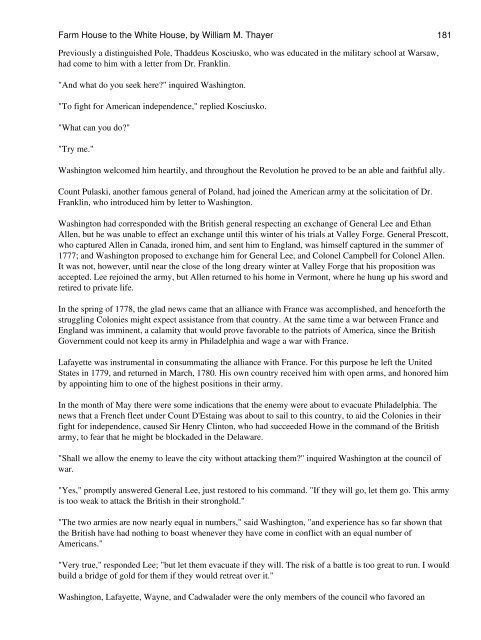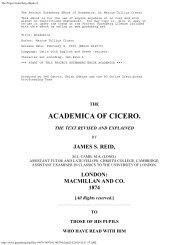From Farm House to the White House - 912 Freedom Library
From Farm House to the White House - 912 Freedom Library
From Farm House to the White House - 912 Freedom Library
You also want an ePaper? Increase the reach of your titles
YUMPU automatically turns print PDFs into web optimized ePapers that Google loves.
<strong>Farm</strong> <strong>House</strong> <strong>to</strong> <strong>the</strong> <strong>White</strong> <strong>House</strong>, by William M. Thayer 181<br />
Previously a distinguished Pole, Thaddeus Kosciusko, who was educated in <strong>the</strong> military school at Warsaw,<br />
had come <strong>to</strong> him with a letter from Dr. Franklin.<br />
"And what do you seek here?" inquired Washing<strong>to</strong>n.<br />
"To fight for American independence," replied Kosciusko.<br />
"What can you do?"<br />
"Try me."<br />
Washing<strong>to</strong>n welcomed him heartily, and throughout <strong>the</strong> Revolution he proved <strong>to</strong> be an able and faithful ally.<br />
Count Pulaski, ano<strong>the</strong>r famous general of Poland, had joined <strong>the</strong> American army at <strong>the</strong> solicitation of Dr.<br />
Franklin, who introduced him by letter <strong>to</strong> Washing<strong>to</strong>n.<br />
Washing<strong>to</strong>n had corresponded with <strong>the</strong> British general respecting an exchange of General Lee and Ethan<br />
Allen, but he was unable <strong>to</strong> effect an exchange until this winter of his trials at Valley Forge. General Prescott,<br />
who captured Allen in Canada, ironed him, and sent him <strong>to</strong> England, was himself captured in <strong>the</strong> summer of<br />
1777; and Washing<strong>to</strong>n proposed <strong>to</strong> exchange him for General Lee, and Colonel Campbell for Colonel Allen.<br />
It was not, however, until near <strong>the</strong> close of <strong>the</strong> long dreary winter at Valley Forge that his proposition was<br />
accepted. Lee rejoined <strong>the</strong> army, but Allen returned <strong>to</strong> his home in Vermont, where he hung up his sword and<br />
retired <strong>to</strong> private life.<br />
In <strong>the</strong> spring of 1778, <strong>the</strong> glad news came that an alliance with France was accomplished, and henceforth <strong>the</strong><br />
struggling Colonies might expect assistance from that country. At <strong>the</strong> same time a war between France and<br />
England was imminent, a calamity that would prove favorable <strong>to</strong> <strong>the</strong> patriots of America, since <strong>the</strong> British<br />
Government could not keep its army in Philadelphia and wage a war with France.<br />
Lafayette was instrumental in consummating <strong>the</strong> alliance with France. For this purpose he left <strong>the</strong> United<br />
States in 1779, and returned in March, 1780. His own country received him with open arms, and honored him<br />
by appointing him <strong>to</strong> one of <strong>the</strong> highest positions in <strong>the</strong>ir army.<br />
In <strong>the</strong> month of May <strong>the</strong>re were some indications that <strong>the</strong> enemy were about <strong>to</strong> evacuate Philadelphia. The<br />
news that a French fleet under Count D'Estaing was about <strong>to</strong> sail <strong>to</strong> this country, <strong>to</strong> aid <strong>the</strong> Colonies in <strong>the</strong>ir<br />
fight for independence, caused Sir Henry Clin<strong>to</strong>n, who had succeeded Howe in <strong>the</strong> command of <strong>the</strong> British<br />
army, <strong>to</strong> fear that he might be blockaded in <strong>the</strong> Delaware.<br />
"Shall we allow <strong>the</strong> enemy <strong>to</strong> leave <strong>the</strong> city without attacking <strong>the</strong>m?" inquired Washing<strong>to</strong>n at <strong>the</strong> council of<br />
war.<br />
"Yes," promptly answered General Lee, just res<strong>to</strong>red <strong>to</strong> his command. "If <strong>the</strong>y will go, let <strong>the</strong>m go. This army<br />
is <strong>to</strong>o weak <strong>to</strong> attack <strong>the</strong> British in <strong>the</strong>ir stronghold."<br />
"The two armies are now nearly equal in numbers," said Washing<strong>to</strong>n, "and experience has so far shown that<br />
<strong>the</strong> British have had nothing <strong>to</strong> boast whenever <strong>the</strong>y have come in conflict with an equal number of<br />
Americans."<br />
"Very true," responded Lee; "but let <strong>the</strong>m evacuate if <strong>the</strong>y will. The risk of a battle is <strong>to</strong>o great <strong>to</strong> run. I would<br />
build a bridge of gold for <strong>the</strong>m if <strong>the</strong>y would retreat over it."<br />
Washing<strong>to</strong>n, Lafayette, Wayne, and Cadwalader were <strong>the</strong> only members of <strong>the</strong> council who favored an















